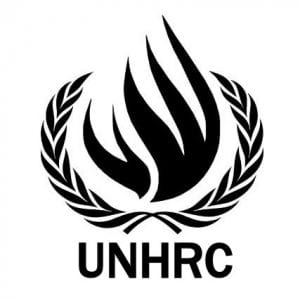By Prof Steven Greer, Professor of Human Rights (University of Bristol Law School).
 On 20 June 2018 the US announced that it was leaving the United Nations Human Rights Council (UNHRC) because it was ‘a cesspool of political bias’ particularly against Israel. Although this decision has been condemned by human rights activists and NGOs around the world, and/or ‘regretted’ by other western states, sadly, the claims upon which it is ostensibly based are not without foundation.
On 20 June 2018 the US announced that it was leaving the United Nations Human Rights Council (UNHRC) because it was ‘a cesspool of political bias’ particularly against Israel. Although this decision has been condemned by human rights activists and NGOs around the world, and/or ‘regretted’ by other western states, sadly, the claims upon which it is ostensibly based are not without foundation.
The protection of human rights is one of the UN’s key objectives and a formal element in all its activities. But, since 2006, the UNHRC has been particularly entrusted with this task. The final nail in the coffin of its discredited predecessor, the UN Commission on Human Rights, was the election of Libya as chair in 2003. Composed of officials from 47 UN member states, the UNHRC is elected on a secret ballot by simple majority of the UN General Assembly (UNGA). Thirteen seats are set aside for African states, thirteen for Asian, eight for Latin American and Caribbean countries, six for Eastern Europe, and seven for Western Europe and the rest. Any member state of the UN, irrespective of its own human rights record, is eligible to stand. The UN requires states, when casting their votes, to take the contribution of candidates to the promotion and protection of human rights into account, and the vast majority of those seeking election make written pledges and commitments to this effect. But it is widely believed that diplomats horse trade with each other about who to vote for, with the usual back room deals and political partisanship this entails.
Since membership of the UNHRC is open to any UN state, if a country such as Saudi Arabia, the Democratic Republic of Congo or China (each of which has served on the UNHRC), can garner enough support from its allies and others, it can be elected no matter how poor its own human rights record. Nor is there any formal mechanism to hold UNHRC members to account once they have joined. Technically, a member found guilty of gross and systematic human rights violations may be suspended by a two-thirds majority of the UNGA. But this procedure has only been used once. In March 2011, acting on a recommendation from the UNHRC, the UNGA agreed by consensus to suspend the Libyan Arab Jamahiriya. However, on the UNHRC’s further recommendation, it reversed this decision only a few months later.
Problems with the Council’s membership and its political bias are compounded by another difficulty: its grindingly bureaucratic activities are very ineffective. The UNHRC considers the human rights records of all the UN’s 193 member states every four and a half years (‘universal periodic review’). It can also receive complaints from anyone about patterns of human rights abuse, about 13,000 of which are annually pre-screened by the Office of High Commissioner for Human Rights and two UNHRC working groups. Special sessions may be convened to consider developing human rights crises such as those in Syria, North Korea, Burundi and South Sudan. Reports on all these dimensions are prepared, presented to, and exchanged between various bodies. Legally non-binding resolutions, said to carry ‘moral authority’, are also adopted. In March 2011, for example, the UNHRC dropped ‘defamation of religions’, typically employed by Muslim states to punish criticism of Islam, from its declaration on freedom of religion or belief. But typically the net result does not amount to much more. In the final analysis, neither the UNHRC or the UN have any power to sanction miscreants beyond denunciation. And any impact this might have is itself invariably affected by political considerations.
Although it is widely accepted that the US’s ostensible reasons for pulling out of the UNHRC reflect genuine defects, since its own human rights record has become increasingly compromised as a result of the Trump Presidency, this is unlikely to be anything more than a convenient excuse. However, by so resoundingly compromising itself, the UNHRC has sadly contributed to this result. The effects upon human rights remain to be seen. But they are much more likely to be negative than positive.
